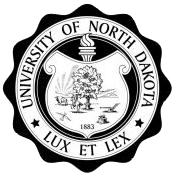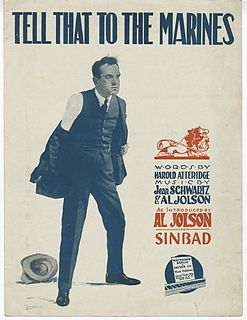External links
- "It's for You, North Dakota U" - und.edu
| Venues |
|
|---|---|
| Bowls & rivalries |
|
| Culture & lore | |
| People | |
| Seasons |
|
National championship seasons in bold | |
| This North Dakota–related article is a stub. You can help Wikipedia by expanding it. |
"It's For You, North Dakota U" (or North Dakota U) is a fight song of the University of North Dakota in Grand Forks, North Dakota. [1] The song was composed by Franz Rickaby in 1921. [2]
It's for you North Dakota U
That we sing, your sons and daughters true;
Cheering our comrades to Victory
Renewing allegiance to UND
Your honor we uphold in every contest,
As your children aye shall do;
And whenever you hear the cry of Odz! Odz! Dzi!
It's for you, North Dakota U. It's for U.
| This North Dakota–related article is a stub. You can help Wikipedia by expanding it. |

Grand Forks is the third-largest city in the American state of North Dakota and the county seat of Grand Forks County. According to the 2010 census, the city's population was 52,838, while that of the city and its surrounding metropolitan area was 98,461. Grand Forks, along with its twin city of East Grand Forks, Minnesota, forms the center of the Grand Forks, ND-MN Metropolitan Statistical Area, which is often called Greater Grand Forks or the Grand Cities.

The University of North Dakota is a public research university in Grand Forks, North Dakota. Established by the Dakota Territorial Assembly in 1883, six years before the establishment of the state of North Dakota, it is the state's oldest university. UND was founded with a liberal arts foundation and expanded to include scientific research.
In U.S. and Canadian sports, a fight song is a song associated with a team. In both professional and amateur sports, fight songs are a popular way for fans to cheer for their team, and are also laden with history; in singing a fight song, fans feel part of a large, time-honored tradition. Although the term "fight song" is primarily used in the United States, the use of fight songs is commonplace around the world, but they may also be referred to as team anthems, team songs or games songs in other countries, even such as Australia, Mexico and New Zealand. Fight songs differ from stadium anthems, used for similar purposes, in that they are usually written specifically for the purposes of the team, whereas stadium anthems are not.

The North Dakota Fighting Hawks are the athletic teams that represent the University of North Dakota (UND), located in the city of Grand Forks, North Dakota.

Ralph Engelstad Arena (REA), commonly called the Ralph, is an indoor arena located on the campus of the University of North Dakota (UND) in Grand Forks, North Dakota and serves as the home of UND men's ice hockey. The arena was built by controversial UND alumnus Ralph Engelstad. The North Dakota Fighting Hawks men's hockey team is the tenant. The arena formerly hosted the defunct North Dakota women's hockey team.

Edward Thomas Schafer is an American businessman and politician who was the 30th governor of North Dakota from 1992 to 2000. Schafer also served as the 29th United States Secretary of Agriculture from 2008 to 2009, appointed by President George W. Bush. From January to July 2016 he served as interim president of the University of North Dakota.
"The Army Goes Rolling Along" is the official song of the United States Army and is typically called "The Army Song". It is adapted from an earlier work titled the "U.S. Field Artillery March".
The North Dakota Fighting Hawks men's ice hockey team (UND) is the college ice hockey team at the Grand Forks campus of the University of North Dakota. They are members of the National Collegiate Hockey Conference (NCHC) and compete in National Collegiate Athletic Association (NCAA) Division I ice hockey. North Dakota is considered one of the premier college hockey programs in the country, and are regarded as one of the most powerful, successful, and storied college hockey programs in NCAA history. UND has made over 30 appearances in the NCAA tournament, appeared in the Frozen Four 22 times, and have won 8 NCAA Division I Championships. They have also won 15 WCHA Regular Season Championships, 3 NCHC Regular Season Championships, and 11 WCHA Tournament Championships. The school's former official nickname was previously the Fighting Sioux, which was ultimately retired due to pressure from the NCAA in 2012. The official school nickname is now the Fighting Hawks, a name that was chosen by the University on November 18, 2015.
The North Dakota Fighting Hawks represent the University of North Dakota, competing as a member of the Missouri Valley Football Conference (MVFC) in the NCAA Division I's Football Championship Subdivision. From 1973 to 2008, they played in the NCAA's NCAA Division II, winning the National Championship in 2001. From 1955 to 1972, they competed in the NCAA's College Division where they participated in and won three bowl games.
Oskee Wow-Wow is the official fight song of the University of Illinois. The song was written in 1910 by two Illinois students, Howard Green and Harold Hill. It was intended as an entry in a contest for a student-composed opera or skit. The skit was never finished, and the students sold the song to the U. of I. Supply Store in Champaign where it was copyrighted in 1911. Melrose Bros. Music Co., Inc. of Chicago published it as sheet music in 1928 Oskee Wow-Wow is an invented phrase similar to other college cheers and yells of that period, and the Illinois cheer was used from before the turn of the Twentieth Century. It was designated as the school's primary fight song primarily because "Illinois Loyalty," the other fight song and official school song, was not well suited to rousing large crowds at a game.

The Nickel Trophy is presented to the winner of the currently annual football game between the rival University of North Dakota (UND) Fighting Hawks and the North Dakota State University (NDSU) Bison. The two universities are approximately 76 miles apart on the eastern border of North Dakota. The two schools suspended play in 2003 and resumed play in 2015.

University Village is a neighborhood in Grand Forks, North Dakota. It is a part of the University of North Dakota (UND) campus and is located directly north of UND's central campus area. The property comprises 160 acres (0.65 km2) located on the banks of the meandering English Coulee directly off U.S. Highway 2. University Village has been developed as a commercial and residential neighborhood with the Ralph Engelstad Arena as the major anchor and has been called "the most valuable piece of real estate in North Dakota."
"Fight On Sioux" is a fight song of the University of North Dakota in Grand Forks, North Dakota. Since the retiring of the Fighting Sioux nickname in 2012, it has been renamed to "U-N-D". Along with the new name, any references to Native American culture have been removed. For example, in the old version, one line stated "And as we go we'll show each foe that we're the toughest tribe between the poles". In the new version of the song, the word "tribe" has been replaced with the word "team".
On Bison is a fight song of North Dakota State University in Fargo, North Dakota.
"Fight For Santa Clara" is the fight song of the Santa Clara University. It was composed by Winnie Cutter, a graduate of the class of 1905. in 1898 following the last-minute football victory over the University of Chicago that clinched a league championship.
The North Dakota Fighting Hawks women's ice hockey team was the college ice hockey team at the Grand Forks campus of the University of North Dakota. They were members of the Western Collegiate Hockey Association (WCHA) and competed in National Collegiate Athletic Association (NCAA) Division I women ice hockey.

"Tell that to the Marines" is a 1918 song, written during World War I. Jean Schwartz and Al Jolson composed the music; Harold Atteridge wrote the lyrics. Al Jolson performed an early version of the song. Based on sales estimates, it reached number two on the Top 100 US songs of its time.

The North Dakota Fighting Sioux controversy refers to the controversy surrounding the now retired nickname and logo of the North Dakota Fighting Hawks a member of the National Collegiate Athletic Association (NCAA), the athletic teams that represented the University of North Dakota based in Grand Forks, North Dakota.
The 2015–16 North Dakota Fighting Hawks men's ice hockey team represented the University of North Dakota in the 2015–16 NCAA Division I men's ice hockey season. The Fighting Hawks were led by first-year head coach Brad Berry, replacing Dave Hakstol who became head coach of the Philadelphia Flyers. His assistant coaches were Dane Jackson, Matt Shaw, and Karl Goehring. The Fighting Hawks played their home games in Ralph Engelstad Arena and competed in the National Collegiate Hockey Conference.

The 1996–97 North Dakota Fighting Sioux men's ice hockey team represented the University of North Dakota in college ice hockey during the 1996–97 NCAA Division I men's ice hockey season. In its 3rd year under head coach Dean Blais the team compiled a 31–10–2 record and reached the NCAA tournament for the thirteenth time. The Fighting Sioux defeated Boston University 6–4 to win the championship game at the Bradley Center in Milwaukee, Wisconsin.